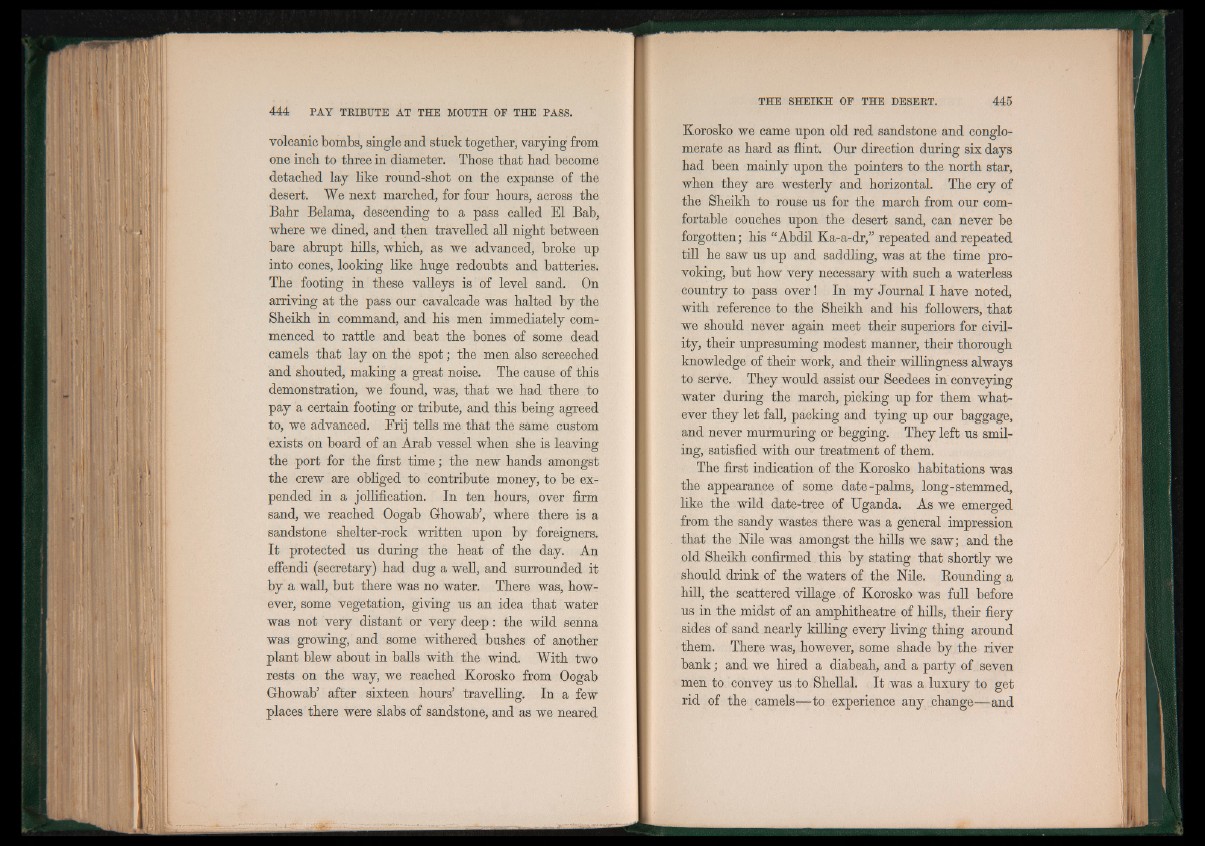
volcanic bombs, single and stuck together, varying from
one inch to three in diameter. Those that had become
detached lay like round-shot on the expanse of the
desert. We next marched, for four hours, across the
Bahr Belama, descending to a pass called El Bab,
where we dined, and then travelled all night between
bare abrupt hills, which, as we advanced, broke up
into cones, looking like huge redoubts and batteries.
The footing in these valleys is of level sand. On
arriving at the pass our cavalcade was halted by the
Sheikh in command, and his men immediately commenced
to rattle and beat the bones of some dead
camels that lay on the spot; the men also screeched
and shouted, making a great noise. The cause of this
demonstration, we found, was, that we had there to
pay a certain footing or tribute, and this being agreed
to, we advanced. Frij tells me that the same custom
exists on board of an Arab vessel when she is leaving
the port for the first time; the new hands amongst
the crew are obliged to contribute money, to be expended
in a jollification. In ten hours, over firm
sand, we reached Oogab Ghowab5, where there is a
sandstone shelter-rock written upon by foreigners.
It protected us during the heat of the day. An
efiendi (secretary) had dug a well, and surrounded it
by a wall, but there was no water. There was, however,
some vegetation, giving us an idea that water
was not very distant or very deep: the wild senna
was growing, and some withered bushes of another
plant blew about in balls with the wind. With two
rests on the way, we reached Korosko from Oogab
Ghowab5 after sixteen hours5 travelling. In a few
places there were slabs of sandstone, and as we neared
Korosko we came upon old red sandstone and conglomerate
as hard as flint. Our direction during six days
had been mainly upon the pointers to the north star,
when they are westerly and horizontal. The cry of
the Sheikh to rouse us for the march from our comfortable
couches upon the desert sand, can never be
forgotten; his “Abdil Ka-a-dr,55 repeated and repeated
till he saw us up and saddling, was at the time provoking,
but how very necessary with such a waterless
country to pass over ! In my Journal I have noted,
with reference to the Sheikh and his followers, that
we should never again meet their superiors for civility,
their unpresuming modest manner, their thorough
knowledge of their work, and their willingness always
to serYe. They would assist our Seedees in conveying
water during the march, picking up for them whatever
they let fall, packing and tying up our baggage,
and never murmuring or begging. They left us smiling,
satisfied with our treatment of them.
The first indication of the Korosko habitations was
the appearance of some date-palms, long-stemmed,
like the wild date-tree of Uganda. As we emerged
from the sandy wastes there was a general impression
that the Nile was amongst the hills we saw; and the
old Sheikh confirmed this by stating that shortly we
should drink of the waters of the Nile. Bounding a
hill, the scattered village of Korosko was full before
us in the midst of an amphitheatre of hills, their fiery
sides of sand nearly killing every living thing around
them. There was, however, some shade by the river
bank; and we hired a diabeah, and a party of seven
men to convey us to Shellal. It was a luxury to get
rid of the camels—to experience any change—and